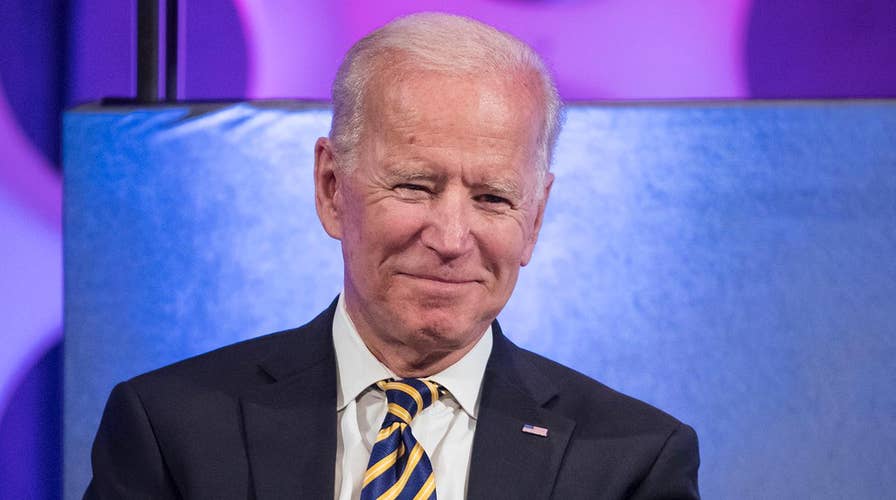Is Biden the moderate choice Democrats need in 2020?
Joe Biden gets cold reception from progressive Democrats; former Clinton pollster Mark Penn and Open Primaries USA president John Opdycke react.
He didn’t immediately back the entire Green New Deal or call for single-payer health care. He stressed values and his experience. He’s former Vice President Joe Biden. He has entered the race for president as a values-oriented moderate and offers Democrats a real choice in primaries that have so far been dominated by candidates who have pandered to more extreme elements of the party.
He waited to announce his intention to seek his party’s nomination until later in the year — generally, a smart decision for someone leading in the polls as the last thing he wants to be is the incumbent.
His late entry marks him as more of a challenger candidate to those who got out there early and staked out their more left-leaning constituencies.
TOM DEL BECCARO: THE DEMOCRATIC PRESIDENTIAL FIELD IS FLUSH WITH CONTENDERS — FOR VICE PRESIDENT
He has had time to put together a professional organization and assemble a lot of the Obama and Clinton donors who want to see the work for the former president continued. His announcement explicitly took credit for his work with Obama on ObamaCare, violence against women and other trademark legislation.
But the Obamas are not giving him their endorsement even though Biden was a loyal vice president. Nixon didn’t get the endorsement of President Eisenhower, either. But this holding back is not so much a rebuke as a strategy -- the Obamas don’t want to get in the middle of a divisive primary so they can be more useful later in the campaign. It’s a disappointment for Biden, but not unexpected. He’s not getting the support from the McCains either, but that would not have been helpful in this very Democratic primary.
Biden has had a challenging history as a presidential candidate, withdrawing in 1988 over plagiarism changes that much of his speeches had been taken from Neil Kinnock, a labor party politician in the UK. But his run as Vice President was generally flawless, as was his service to the country. He is seen as dignified, likable and experienced — and has a lot more hair today than in 1988, even if it is grayer.
Biden will inherit many of the Hillary Clinton voters, and his challenge will be to hold on to that core base and expand out to younger voters and those in the African-American and Latino communities who are open to Biden but may be attracted to some of the more exciting new generation candidates.
Biden’s ace in the hole is that he has an appeal to working-class voters and that makes him a much stronger general election candidate than any other Democrat in the race.
He had a setback with allegations of his touching and kissing a lot of fellow politicians waiting to speak, but he responded to it, apologizing for anything inappropriate and while it may dog him on the campaign trail, it has largely died down.
In his announcement Thursday Biden contrasted his values and dignity with President Trump, raising Charlottesville, but was reserved in his language compared to Bernie Sanders and others who hurled bare-knuckled epitaphs at the president while saying they would be a better choice.
The big issue for Biden and for the Democratic Party will be whether the primary voters want to return to the Obama policies or want to move in a more radical direction.
There are structural elements facing Biden on the path to the nomination, too, particularly the delegates that can be won in caucuses instead of primaries, where activists have much greater power. It’s those caucuses that Obama used effectively to defeat Hillary Clinton in 2008. Biden will likely perform well in the big states, but he will need an effective caucus organization to have a chance of winning the nomination.
There will be great pressure on Biden to support open borders, single-payer health care, slavery reparations, impeachment and other policies of the left and he will have some tough choices.
He indicated in his announcement that he will be a candidate for the middle class and named health care, equality, guns and climate change as important issues without committing to radical solutions. Whether he can hold the line on these issues and position himself as a responsible moderate with broad appeal will determine whether he differentiates himself from a crowded field of 20 candidates or becomes unelectable.
His announcement also skirted the economy as an issue, resting instead on values, and that’s an issue where he will need to show that he can take Trump on with something other than the tax and spend policies of the past.
He will also need to defend his record and explain how he has evolved on many issues. Of course, unlike many of the other candidates, he has a record.
Could Joe Biden be the next Jeb Bush — the candidate with big money and elite support but no constituency? It’s possible but unlikely.
CLICK HERE TO GET THE FOX NEWS APP
His polls have generally held up at a third or more of the Democrats and he can be a tough campaigner, unafraid to deck his opponents with stinging wit. But getting a majority of the Democratic delegates will be equally tough unless a lot of candidates drop out after the first few primaries and clear the field.
The good news is that Democrats, as of Thursday, now have a more moderate, experienced choice with substantial support. Whether they will take it, however, is far from decided and with so many credible and not so credible candidates, we may even be headed for a Democratic convention with no winner on the first ballot.









































